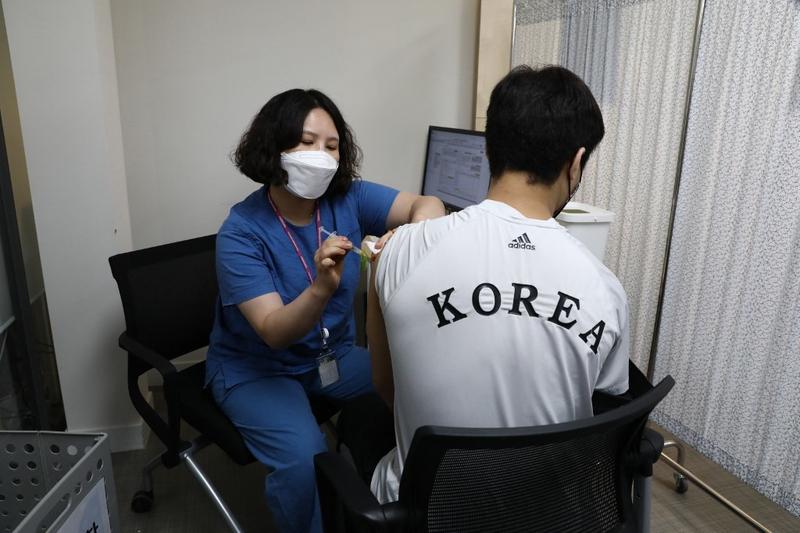 South Korean Olympic judo team member An Ba-ul receives the first dose of the Pfizer-BioNTech COVID-19 vaccine during a vaccination program for the country's Tokyo 2020 Olympics and Paralympics team at the National Medical Center in Seoul on April 29, 2021. (PHOTO / AFP)
South Korean Olympic judo team member An Ba-ul receives the first dose of the Pfizer-BioNTech COVID-19 vaccine during a vaccination program for the country's Tokyo 2020 Olympics and Paralympics team at the National Medical Center in Seoul on April 29, 2021. (PHOTO / AFP)
SEOUL- For the first time in South Korea, a nursing assistant who was paralyzed after receiving a COVID-19 vaccine was recognized as a victim of an industrial accident, making her eligible for government benefits and compensation.
The nursing assistant, who has not been identified, received AstraZeneca's shot on March 12 and later suffered from double vision and paralysis and was diagnosed with acute encephalomyelitis, the state-run Korea Workers' Compensation & Welfare Service said on Friday.
The service said in a statement the woman did not have underlying conditions and there seemed to be a "a reasonable causal link between the side effects and the vaccination".
AstraZeneca, asked about the case, did not refer to it directly but said patient safety was of the utmost importance for it and regulators around the world.
The nursing assistant, who has not been identified, received AstraZeneca's shot on March 12 and later suffered from double vision and paralysis and was diagnosed with acute encephalomyelitis, the state-run Korea Workers' Compensation & Welfare Service said
ALSO READ: South Korea seen revising rules on virus tests for foreign workers
"International regulators, including the World Health Organization, continue to reaffirm that the vaccine offers a high-level of protection against all severities of COVID-19 and variants of concern, and is a key part of global efforts to overcome the virus," AstraZeneca said in a statement.
The Korea Disease Control and Prevention Agency (KDCA) had determined that with the available evidence, it could not verify a connection between the woman's case and the vaccine but it was open to re-evaluation when more evidence was available, said agency official Choi Seung-ho.
South Korea, like many other countries, has indemnified major vaccine makers against claims and set up funds to cover any costs.
It offers up to 10 million won (US$8,747) to anyone who suffers serious side effects from the coronavirus vaccines but this is the first case in which the side effects are considered an industrial accident.
Healthcare workers were among the first to be eligible for the vaccines in South Korea and were encouraged by employers to be vaccinated but they were not forced to.
The compensation service concluded that the woman was eligible for government compensation and benefits under the Industrial Accident Compensation Insurance Act because her medical situation was related to her work.
She will be compensated for missed work hours and benefits will cover her medical expenses and disabilities, the service spokesman told Reuters. There were six more cases pending a decision, the spokesman said.
The KDCA said a total of 1,562 cases, including 14 deaths, had been reviewed for compensation regarding damages from COVID-19 vaccination, of which 983 had been compensated. There has been no compensation for a case involving a death.
READ MORE: South Korea to ease social distancing to help small business
Liability and claims
AstraZeneca has been granted protection from product liability claims related to its COVID-19 vaccine by most of the countries with which it has struck supply agreements.
After reports of a rare blood clots associated with the vaccine this year, several countries announced restrictions on its use in younger people.
In Asia, countries including Singapore, Australia, Thailand and Malaysia have financial assistance programmes or set up compensation funds for those who suffer serious side effects from vaccines.
In Thailand, the government has paid out 13 million baht (US$389,454) to 400 cases of COVID-19 vaccine side-effects, its health agency said. In cases of death, it pays 400,000 baht, and side effects that impact daily life, 240,000 baht.
Payments are not proof, however, that the vaccines have side effects, it said, because that is under the purview of an expert panel.
This year, the World Health Organization agreed a no-fault compensation plan for claims of serious side effects in people in 92 poorer countries due to get COVID-19 vaccines via the COVAX sharing scheme.
India, which has the second-highest number of cases globally, is a holdout. The government is in talks over legal protection sought by companies like Pfizer and Moderna, and no shots have been shipped by these companies.
The U.S. government has compensation fund for people who are victims of side effects of a vaccine, but lawyers say few claims have been compensated historically.


